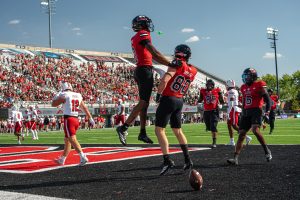Views conflict over happy hour
August 29, 1989
This is the second installment of a three-part series on the problems associated with alcohol abuse and the proposed changes in happy hour restrictions.
Alcohol marketing tactics and the resulting influence on drinking practices have raised concern from professionals in alcohol-related fields as well as tavern owners.
Jon Dalton, former NIU vice president for student affairs, supports a proposed ban on happy-hour drink specials and expressed concern about drink promotions. Bar owners respond to market competition by implementing some “flat-out dangerous” sales tactics, he said.
Many owners feel obligated to resort to such marketing strategies in order to attract customers; however, “nobody likes to do this. It is not a responsible way to serve alcohol,” Dalton said.
Alcohol abuse is “an issue that extends beyond the campus. We need the help of the community,” Dalton said.
Lito Nepomiachi, who owns The Jungle, 1027 W. Hillcrest, said he does not believe patrons become more drunk when specials are offered. If a problem does arise, “the bar controls sales,” he said. “When a person is too drunk, we cut them off.”
Nepomiachi said he disagrees with the proposed ban because “businesses should be able to regulate themselves.” Government regulations “don’t control candy stores which are so bad for the kids,” he said.
Bob Daniels, owner of Otto’s tavern, 118 E. Lincoln Hwy., said he supports the proposed ban on happy hours and expressed interest in fighting alcohol-related problems. “It’s a matter of watching out for the consumer,” he said.
Daniels said he expects the ban to help his sales by taking potential business from other taverns which might now offer more booze for the buck. “When a person’s had enough, who’s doing who a favor” by continuing to serve them, he said.
The ban “is what people want. You can’t argue with a couple million people,” he said.
Glen Goering, owner of McCabe’s Lounge & Entertainment, 323 E. Lincoln Hwy., said although he “only can gain by regulated prices, I don’t think it’s right for any government intervention on my pricing.”
Labeling the proposed ban “communistic price-fixing,” he said, “I still believe in free enterprise and capitalism.”
Goering said he has been in the liquor business for 17 years, and “you don’t come to McCabe’s to get drunk. That is a fallacy. You don’t come to any bar only to get drunk.” No change in drinking behavior occurs with or without drink specials, he said.
The Ben Gordon Community Mental Health Center, 12 Health Services Drive, provides outpatient care for those needing individual or group therapy for alcoholism. The center also runs a residential house for recovering male alcoholics, said Kris Povlsen, the center’s director of prevention services.
Povlsen said drink specials “most definitely contribute to the problem—people will imbibe and indulge more. Happy hours encourage drinking more in shorter periods of time.”
College students are more prone to alcohol abuse than other adults because the environment on college campuses is conducive to drinking for the sake of becoming drunk, he said. “Students glamorize alcohol use,” he said. “Younger people tend to not be aware of the consequences or of the problems with behavior in terms of alcohol use.”
Povlsen described the intended message of the proposed legislation as, “Let’s not provide an environment that encourages and induces irresponsible drinking.”
Povlsen said if an individual already has the disease of alcoholism, then banning happy hours will not make a difference. “The ban will reach the social drinker who ends up drinking more because of happy hours,” he said.
Sen. Patrick Welch, D-Peru, said happy hours are “not a major source of business that can’t be offset with other specials (such as) free hors d’oeuvres, popcorn or free use of the dart board.”
Wednesday: The frightening statistics of alcohol abuse, which have included several NIU casualties in the last year.
See Views Page 4
Views
Continued from Page 1






